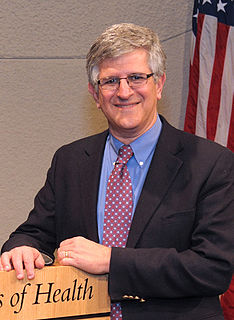A Quote by David Oshinsky
So, obviously, autism - which is the key in this - is a very big problem. We need more studies about it. We certainly have to try to figure out what causes it and why and do something about it. But to tab it to vaccines, I think, is a real mistake. Not only is there no evidence, but what it leads to is larger numbers of unvaccinated children. And that's not only a problem for polio. It's a problem for a wide range of vaccine-preventable diseases.
Related Quotes
The main problem, certainly, for the people who will not get vaccinated with Thimerosal, which was put into polio vaccine. And the belief was that it may cause autism. And there's been an awful lot done in terms of studies in Western Europe, Canada, the United States, and no correlation was found between Thimerosal and autism from those children who took vaccines. Indeed, when Thimerosal was taken out of many of these vaccines, the autism rate in the United States still rose.
The problem facing humanity today is not a political problem; it's not a financial problem; it's not a military problem. It's obviously a spiritual problem. That is, it has to do with what we believe to be true about who we are, where we are, why we are where we are, and what are we doing on the Earth. What is the purpose of life itself? What we need right now are leaders or models, people who will stand up and not only help to write a cultural story, but help to model it in the way that they interact with each other.
In other words, the real problem is not exterior. The real problem is interior. The real problem is how to get people to internally transform, from egocentric to sociocentric to worldcentric consciousness, which is the only stance that can grasp the global dimensions of the problem in the first place, and thus the only stance that can freely, even eagerly, embrace global solutions.
The question "What shall we do about it?" is only asked by those who do not understand the problem. If a problem can be solved at all, to understand it and to know what to do about it are the same thing. On the other hand, doing something about a problem which you do not understand is like trying to clear away darkness by thrusting it aside with your hands. When light is brought, the darkness vanishes at once.
Cities are never random. No matter how chaotic they might seem, everything about them grows out of a need to solve a problem. In fact, a city is nothing more than a solution to a problem, that in turn creates more problems that need more solutions, until towers rise, roads widen, bridges are built, and millions of people are caught up in a mad race to feed the problem-solving, problem-creating frenzy.
You know how it always is, every new idea, it takes a generation or two until it becomes obvious that there's no real problem. It has not yet become obvious to me that there's no real problem. I cannot define the real problem, therefore I suspect there's no real problem, but I'm not sure there's no real problem.
I think it's more normal to make a movie dealing with love, sexual or not, than to make movies about bank robberies, which very rarely happen in real life. So I would say the problem is not what some people feel is normal, I would say the problem is why this whole industry is far more obsessed with filming scenes of dominance, guns, invasion.
The zooming wealth of the top 1 percent is a problem, but it's not nearly as big a problem as the tens of millions of Americans who have dropped out of high school or college. It's not nearly as big a problem as the 40 percent of children who are born out of wedlock. It's not nearly as big a problem as the nation's stagnant human capital, its stagnant social mobility and the disorganized social fabric for the bottom 50 percent.
We have a violence problem in America. And no one is having a debate about the violence problem. And I think this is a missed opportunity to have an honest and open conversation in this country about why these horrifying things are happening, not simply what they're using to carry this out, but why are people doing this to begin with?
Today, however, anti-vaccine activists go out of their way to claim that they are not anti-vaccine; they’re pro-vaccine. They just want vaccines to be safer. This is a much softer, less radical, more tolerable message, allowing them greater access to the media. However, because anti-vaccine activists today define safe as free from side effects such as autism, learning disabilities, attention deficit disorder, multiple sclerosis, diabetes, strokes, heart attacks, and blood clots—conditions that aren’t caused by vaccines—safer vaccines, using their definition, can never be made.







































